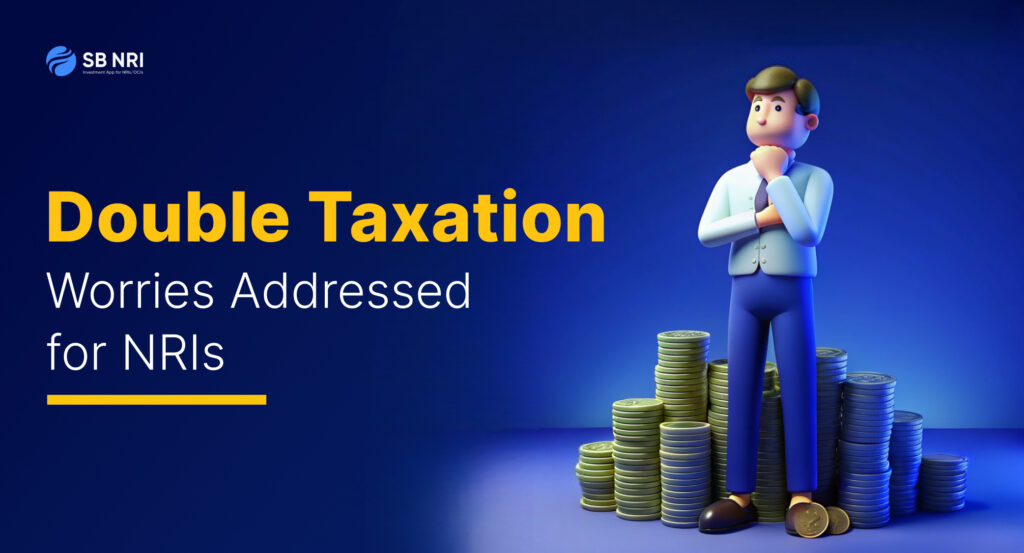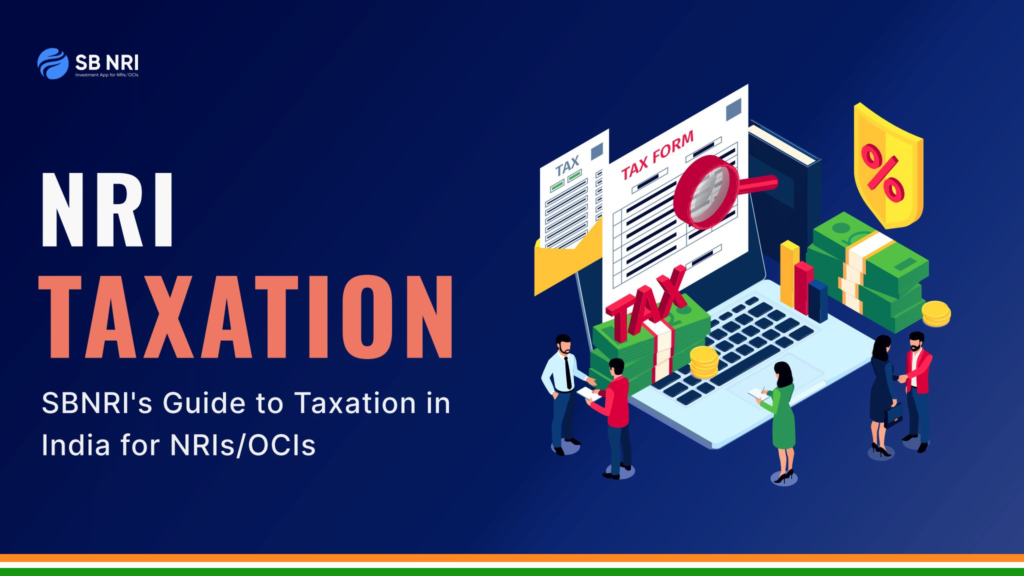
Non-Resident Indians (NRIs) stuck in India as a result of the COVID-19 travel restrictions had double taxation worries that were recently addressed by the government of India. Authorities have asked such non-residents who faced double taxation in the due course of their stay in India to submit the relevant information by the end of March.
Double Taxation worries of NRIs stuck in India: A Background
As a result of COVID-19, lockdowns were imposed in India that had all the domestic and international travel suspended. Under such conditions many NRIs got stuck in India who were on a short visit. Now, as per the Income Tax Act, 1961, there are certain criteria that define the residential status of an individual. Once someone becomes a resident of India, their global income becomes taxable in India. As a result of this many NRIs had to face a change in their taxation but a relief was given in the last financial year (2019-2020) to such individuals.
To avoid genuine hardship in such cases, the CBDT has decided vide circular no 11 dated May 8, 2020, that to determine the residential status under section 6 of the Act during the previous year 2019-20 in respect of an individual who has come to India on a visit before 22nd March, 2020 and:
- has been unable to leave India on or before 31st March 2020, his period of stay in India from 22nd March, 2020 to 31st March, 2020 shall not be taken into account; or
- has been quarantined in India on account of Novel Corona Virus (Covid-19) on or after 1st March, 2020 and has departed on an evacuation flight on or before 31st March, 2020 or has been unable to leave India on or before 31st March, 2020, his period of stay from the beginning of his quarantine to his date of departure or 31st March, 2020, as the case may be, shall not be taken into account; or
- has departed on an evacuation flight on or before 31st March, 2020, his period of stay in India from 22nd March, 2020 to his date of departure shall not be taken into account.

Note: CBDT had earlier informed that a circular excluding the period of stay of these individuals up to the date of normalisation of international flight operations, for determination of the residential status for the previous year 2020-21 shall be issued after the said normalisation.
India’s Central Board of Direct Taxes (CBDT) said it received various requests for “relaxation in determination of residential status for year April 2020 to March 2021” from NRIs or non-resident Indians, who had to prolong their stay due to the movement restrictions.
Also read: Tax Residency Certificate (TRC) for Non-Resident Indians

Relief from Double Taxation: What has happened?
In a notice on late Wednesday (3rd March), the CBDT said that NRIs who faced double taxation, even after the initial relief provided by the government, would need to provide requested information for the department’s review. Let’s take a glance at some important pointers around this relief from double taxation:
- The information has to be submitted in Form –NR and is to be submitted electronically to the Principal Chief Commissioner of Income-tax (International Taxation)
- The details are needed to be submitted by 31st March 2021
- It is for individuals who are facing double taxation even after the reliefs provided by the government under DTAA
Also read: Lower TDS Certificate for NRI Property Sale in India
Double Taxation Avoidance Agreement (DTAA)
India has entered into the Double Taxation Avoidance Agreement (DTAA) with more than 90 countries across the world. Whereby NRIs have to pay tax in either of the countries. In other words, NRIs can avoid getting taxed on the same income twice in the country of their residence and India by applying for relief under DTAA between the two countries. There are two ways to claim tax relief – exemption method and tax credit method. As per the exemption method, the income of NRIs is taxed in one country and exempted in another. As per the tax credit method, the income is taxed in both countries, the exemption can be claimed in the country of residence. NRIs currently living in one of these countries are exempt from double taxation.

Calculate your TDS Refund with SBNRI’s TDS Refund Calculator
A TDS refund is the process of reclaiming the excess tax deducted at source by the payer if the actual tax liability of the taxpayer is lower than the TDS deducted. This situation typically arises when the income tax calculated on the total income is less than the TDS already deducted. To claim a TDS refund, taxpayers need to file an income tax return (ITR). The Income Tax Department processes the ITR and verifies the details. If the tax department finds that the TDS paid is more than the actual tax liability, the excess amount is refunded to the taxpayer.
You can easily find out how much tax refund you can get by calculating your TDS Refund from this TDS Refund Calculator.
Also read: New Rules for NRI Taxation in India FY-2023-24
Access SBNRI’s Exclusive Guide on DTAA

NRIs and OCIs can now access SBNRI’s exclusive Guide on DTAA covering in-depth information about the applicability of DTAA, rules specific to various countries, how to avail DTAA benefits, and reduce your taxation in India and your home country.
Access NRI Guide on DTAA here
Looking for NRI ITR Filing? Connect with SBNRI NRI Tax Expert CA Today!

At SBNRI, we have simplified ITR filing for NRIs/OCIs through a smooth digital journey. Be it Basic Filing, Advanced Filing (includes Capital Gain, etc.), or Premium Filing (Foreign Income), we can help you assess the right computation and lower your tax liability.
“We’ve helped over 500+ NRIs/OCIs file ITR returns and more than 25,000+ across other taxation services last financial year and we’d love to help you out too”
You can download SBNRI App or connect with NRI Tax Expert team directly via the button below.
FAQs
What are some of the benefits of DTAA for NRIs?
Given below are some of the benefits that NRIs can avail under DTAA:
a. Dual tax elimination
b. Lower tax rates
c. Profitable investments
d. Prevention of tax evasion
What are the documents required for availing DTAA benefits?
An NRI has to submit the following list of documents if they want to avail benefits of the DTAA-a. Self-attested passport and visa copy
b. Self-attested PAN card copy
c. Self-declaration plus indemnity format
d. Tax Residency Certificate (TRC)
e. PIO proof copy if applicable
How to save on taxes in India by NRI?
NRIs can save on taxes in India by utilizing several deductions and benefits. They can claim a standard deduction of 30% and deduct property taxes and interest from a home loan.
Should NRIs file tax returns in India?
NRIs should file income tax returns in India if they earned income in India during the financial year. Their tax liability depends on their residential status.
What are 120 days rules for NRIs?
The 120 days rule for NRIs states that if they spend more than 120 days but less than 182 days in India and their total income from India is ₹15 lakh or more, they are considered “resident but not ordinary resident” (RNOR).
How to avoid TDS for NRI?
- One way is by opening a specific bank account like:
- A Non-Resident Ordinary Rupee Account (NRO)
- A Foreign Currency Non-Resident Account (FCNR)
- A Non-Resident External Account (NRE)
What is the rule for NRI in ITR?
If the annual returns for NRIs cross the basic exemption limit of Rs 2.5 lakh, NRIs should file their return. However, there are cases where the NRIs/OCIs need to file their return even if their income is less than Rs 2.5 lakh. Here are those cases:
- If you have deposits or aggregate of more than 1 cr in one or more current accounts
- If you spend more than 2 lacs on foreign travel
- If you spend more than 1 lacs on electricity expenditure
What is the penalty for not declaring NRI status?
There is no penalty for not declaring NRI status. However, we advise you to update your NRI status on the IT portal and also close your resident savings account. This will help you to avoid any discrepancies from the IT department and also help you comply with the regulations.
Do NRIs pay capital gains tax?
Yes, capital gains tax provisions for an NRI are similar to those for a resident individual except for the applicability of TDS provisions. Like resident investors, capital gains tax for an NRI depends on the holding period and the type of property sold.
How long can I maintain NRI status after returning to India?
For RNORs returning to India, they can retain their RNOR status for up to 3 years after their return. During this period, any income earned in India will be taxable, while income earned abroad will not be taxable, similar to the tax treatment for NRIs, for those 3 years post-return.
What is the 4 year rule of NRI?
An individual is considered an NRI under the Income Tax Act if they have been in India for fewer than 182 days in the preceding financial year, or if they have been in India for fewer than 60 days during the previous year and 365 days or less over the past four years.
What is the 182 days rule for NRI?
NRI can stay in India for more than 182 days during a financial year. However, doing so will change their residential status from NRI to resident. In other words, to retain NRI status, an individual must stay in India for fewer than 182 days in a financial year.
What is the 240 days rule for NRI?
The 240 days rule for NRI refers to a provision introduced in the Finance Act 2020. According to this rule, an individual will be considered an NRI if they stay in India for 240 days or less during a financial year, provided they also meet certain other conditions related to previous years’ stays in India. This amendment was made to provide more clarity and flexibility for determining NRI status, ensuring that individuals who spend a significant portion of the year outside India are not taxed as residents.
When is the last date to file an income tax return in India for NRIs?
NRIs need to file income tax returns in India before 31st July without any penalty, unless the government extends the last date.
Is NRI subject to capital gains tax on sale of a flat owned by him/her in India?
Yes. An NRI seller is liable for capital gains tax in India upon the sale of their property. The purchaser needs to deduct taxes on sale consideration. The tax deduction rate for a long-term capital gain is 20% plus applicable surcharge and cess. On a short-term capital asset, tax is deductible at 30% plus applicable surcharge and cess. However, there is a provision under the law wherein you can apply for a lower TDS certificate.
Can NRIs continue to use their resident savings account?
As per the regulations of the Foreign Exchange Management Act (FEMA), it is prohibited for non-residents to maintain resident savings accounts in India. Therefore, it is necessary to convert your resident savings account into an NRO (Non-Resident Ordinary) account. Failure to comply with this requirement and continuing to use the resident account may result in significant penalties being imposed.
How can NRIs benefit from Double Tax Avoidance Agreement (DTAA)?
NRIs have two avenues to benefit from double taxation relief, as outlined below:
- Tax Credit Method: In the Tax Credit Method, the home country allows the NRI to claim a tax credit for the tax paid in the source country where the income is earned.
- Tax Exemption Method: In the Tax Exemption Method, the income is taxed in one country and exempted from taxation in another country.
Do NRIs need to be present in India to file an ITR?
No, it is not true. NRIs can easily file and validate their income tax returns online from anywhere in the world.
Do NRIs need to pay advance tax?
If their tax liability exceeds Rs. 10,000 in a financial year, NRIs have to pay advance tax. Under Section 234B and Section 234C, interest will be applicable if you don’t pay your advance tax.
Is there any income tax for NRI in India?
An NRI’s income which is earned or accrued in India is taxable in India. The income earned outside India by an NRI is not taxable in India. Interest earned on NRE and FCNR savings and fixed deposit accounts is tax-free in India. However, interest earned on an NRO account is taxable.
What is the income tax rate for NRIs?
NRI income tax rates are mentioned in the first table in this blog along with the NRI income tax slabs.
When should an NRI file an income tax return in India?
Like resident taxpayers, an NRI must file his/her return of income in India if his/ her Indian income exceeds Rs. 2.5 lakh for the financial year. The last date for income tax filing for NRIs is 31st July of the assessment year.
Is an NRI subject to capital gains tax if he sells his house property in India?
Yes, an NRI will be liable to pay capital gains tax in India upon the sale of his flat. The buyer must deduct taxes on the quantum of gains made by an NRI. The tax deduction rate for a long-term asset would be 20%.
Can NRI claim TDS refund?
If an NRI files Income Tax Return (ITR) after the termination of the financial year in India, they can claim on the deducted TDS. NRI will need to compute his/ her income and tax liability as per the existing slab rates to claim a refund on the TDS.
Is TDS applicable to NRIs?
Interest earned on NRE and FCNR accounts is tax-free in India. Hence there is no TDS. However, interest earned on an NRO account is taxable and will be subject to a TDS of 30%. Other incomes like capital gains, fees for professional services, rental income, etc. may also be liable to TDS.
How can NRI avoid TDS?
An NRI can reduce the TDS liability on sale of his/ her property. The NRI needs to file an application in Form 13 with the Income Tax Department for issuance of certificate for lower or Nil deduction of TDS.
Can NRI claim deductions under Section 24?
NRIs can get tax deductions if they have some taxable income in India. They can claim deductions on the repayment of principal and interest components from the taxable income u/s 24, 80C and 80EE of the Income Tax Act.
Is new tax regime applicable to NRIs?
Yes new tax regime is applicable to NRIs. The new tax regime allows the basic exemption to Rs. 3,00,000. However, NRIs can’t claim the rebate on full tax for income up to Rs. 7 lakh.
What is the 80C limit for 2023-24 for NRIs?
Section 80C enables NRIs to lower their taxable income by a maximum deduction of ₹ 1.5 lakh. This deduction can be achieved by making tax-saving investments, such as paying life insurance premiums, expenses like school tuition fees. However, if NRI taxpayers choose the new tax regime, they are not permitted to claim this deduction.



